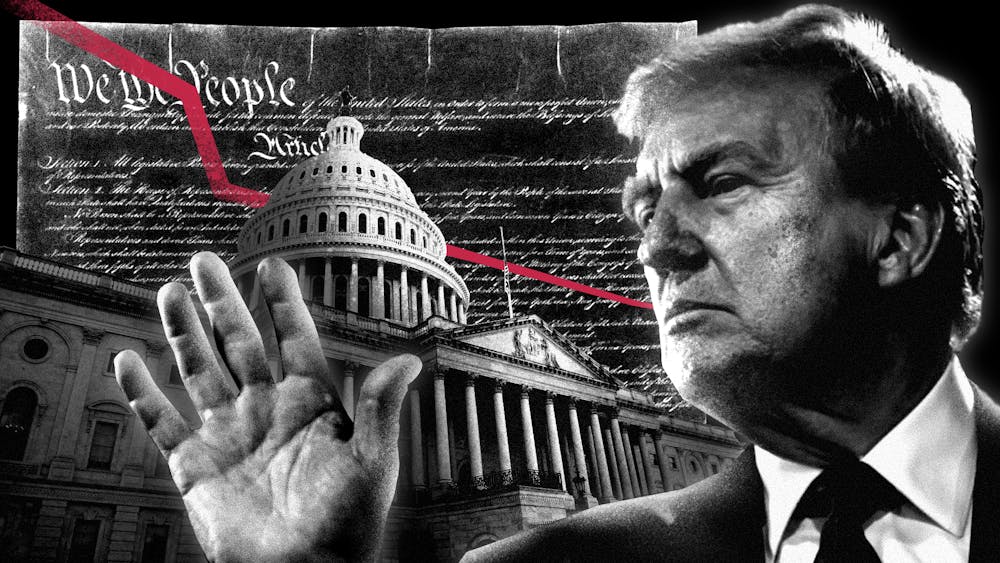
Taxation without representation is tyranny: The words of James Otis echo as true today as they did in 1761 when he first uttered them in public arguments and speeches across Massachusetts. When crafting the Constitution in the 1780s, the Founders took great care in giving Congress, not the executive, total control over tax policy. By giving Congress control over tax policy, the Founders ensured that taxation would be subject to democratic accountability — a direct response to the lack of representation that had sparked unrest and revolution in the colonies. For almost 300 years, this sentiment has been embedded in the American political ethos and the democratic education embraced by institutions including Penn. However, the Trump administration is currently threatening to flip this concept entirely on its head, which would have serious repercussions for the American people.
Trump’s “Liberation Day” tariffs upend this concept of representation by giving the executive unilateral control over raising and lowering taxes. Though the Trump administration largely ignores the fact, these tariffs are just a tax increase on the American consumer. In fact, according to J.P. Morgan, Trump’s liberation day tariffs are the largest tax hike since the 1968 Revenue Act. Administration officials claim these tariffs will generate hundreds of billions in revenue, conveniently omitting that this money will come directly from American consumers. This might seem like a high-level policy with only international implications, but it matters to everyone. Because Trump’s economic actions strike at the heart of democratic representation, all Americans are implicated, including Penn students. If a President can impose taxes unilaterally, it impacts all of us whether we’re paying tuition or buying groceries.
So if these tariffs are, in practice, a massive tax hike, who authorized them? Not Congress.
In regard to raising government revenue, the Constitution is unequivocal. Article 1, Section 8 states that “the Congress shall have Power To lay and collect Taxes, Duties, Imposts and Excises.” The Founders placed this power in the legislative branch precisely to ensure democratic accountability.
The Courts have upheld Congress’ responsibility in crafting tax policy. In the 1928 case, J.W. Hampton Jr. & Co. v. United States, the Supreme Court ruled that Congress may delegate some powers to the executive branch only if it provides an “intelligible principle” to guide their use. Broad, unchecked delegation of taxing authority would violate the nondelegation doctrine — the idea that Congress cannot simply abdicate its core constitutional responsibilities.
Defenders of Trump’s tariffs argue that laws like the Trade Expansion Act of 1962, the Trade Act of 1974, or the International Emergency Economic Powers Act allow the president to adjust tariffs under certain circumstances, particularly in response to national security threats or unfair trade practices. But these statutes were not written to give the executive a blank check. They were meant to provide flexibility in specific, limited circumstances.
Trump’s use of these laws to impose tariffs under the pretense of “national emergency” is a dramatic abuse of power. It’s the kind of executive overreach we’re warned about everywhere — from middle school civics to college seminars. There is absolutely no credible evidence that steel and aluminum imports from long-standing allies like Canada and the European Union pose a national security threat. Even the Department of Defense admitted as much. Additionally, Trump justified his emergency declaration by claiming fentanyl was pouring in from the Canadian border. In reality, just 0.2% of all fentanyl seizures by the Customs and Border Protection came from Canada — a total of 43 lbs. It’s hard to argue that this constitutes an “unusual and extraordinary threat” which would allow the President to declare a national emergency.
The consequences of Trump’s policies go far beyond constitutional abuse. These tariffs risk alienating long-standing allies, emboldening economic competitors like China, and undermining the WWII international trade order that the U.S. helped create. A foreign policy built on blanket tariffs and executive threats sends a message of instability to global markets and allies alike.
Trump’s willingness to stretch legal loopholes for political ends is part of a broader pattern of executive overreach. His recent threats to defund elite universities — including the hundreds of millions of dollars in federal funding that support Penn’s research, healthcare, and financial aid — echo the same instinct: to bypass democratic processes and punish dissent through unilateral economic power. These actions threaten not just policy, but the academic freedom and institutional integrity of our own campus.
Fortunately, Congress is beginning to wake up to this constitutional overreach. On April 2, the Senate narrowly passed a resolution to terminate President Trump’s emergency declaration, and bipartisan legislation was introduced to limit future abuses. Under the proposed law, any tariffs imposed by the president would expire within 60 days unless explicitly approved by Congress.
This legislation is a step in the right direction, but its difficulty in becoming law underscores just how far we’ve drifted from our founding principles. If taxation without representation was tyranny in 1761, it is still tyranny today. No matter how cleverly it is disguised as economic policy, a tax imposed by executive fiat is still a tax without representation.
To preserve our constitutional balance, Congress must reclaim its rightful authority over tariffs and taxation. The alternative is a dangerous precedent where presidents of any party can unilaterally raise taxes, punish industries, or weaponize trade without a single vote in Congress. This alternative harms all of us. It is not only contrary to our democratic republic, but also contrary to American values at large.
BO GOERGEN is a College junior studying political history and international relations. His email is rgoergen@sas.upenn.edu.
The Daily Pennsylvanian is an independent, student-run newspaper. Please consider making a donation to support the coverage that shapes the University. Your generosity ensures a future of strong journalism at Penn.
Donate



